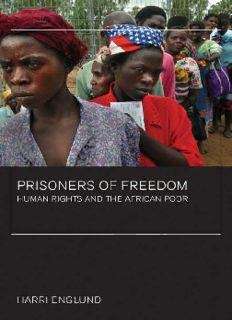
Prisoners of Freedom: Human Rights and the African Poor (California Series in Public Anthropology) PDF
Preview Prisoners of Freedom: Human Rights and the African Poor (California Series in Public Anthropology)
Prisoners of Freedom california series in public anthropology The California Series in Public Anthropology emphasizes the anthropologist’s role as an engaged intellectual. It continues anthropology’s commitment to being an ethnographic witness, to describing, in human terms, how life is lived beyond the borders of many readers’experiences. But it also adds a commitment, through ethnography, to reframing the terms of public debate—transforming received, accepted understandings of social issues with new insights, new framings. Series Editor: Robert Borofsky (Hawaii PaciWc University) Contributing Editors: Philippe Bourgois (UC San Francisco), Paul Farmer (Partners in Health), Rayna Rapp (New York University), and Nancy Scheper-Hughes (UC Berkeley) University of California Press Editor: Naomi Schneider 1. Twice Dead: Organ Transplants and the Reinvention of Death, by Margaret Lock 2. Birthing the Nation: Strategies of Palestinian Women in Israel, by Rhoda Ann Kanaaneh (with a foreword by Hanan Ashrawi) 3. Annihilating DiVerence: The Anthropology of Genocide,edited by Alexander Laban Hinton (with a foreword by Kenneth Roth) 4. Pathologies of Power: Health, Human Rights, and the New War on the Poor, by Paul Farmer (with a foreword by Amartya Sen) 5. Buddha Is Hiding: Refugees, Citizenship, the New America,by Aihwa Ong 6. Chechnya: Life in a War-Torn Society, by Valery Tishkov (with a foreword by Mikhail S. Gorbachev) 7. Total ConWnement: Madness and Reason in the Maximum Security Prison, by Lorna A. Rhodes 8. Paradise in Ashes: A Guatemalan Journey of Courage, Terror, and Hope, by Beatriz Manz (with a foreword by Aryeh Neier) 9. Laughter Out of Place: Race, Class, Violence, and Sexuality in a Rio Shantytown, by Donna M. Goldstein 10. Shadows of War: Violence, Power, and International ProWteering in the Twenty-First Century,by Carolyn Nordstrom 11. Why Did They Kill? Cambodia in the Shadow of Genocide, by Alexander Laban Hinton (with a foreword by Robert Jay Lifton) 12. Yanomani: The Fierce Controversy and What We Can Learn from It, by Robert Borofsky 13. Why America’s Top Pundits Are Wrong: Anthropologists Talk Back, edited by Catherine Besteman and Hugh Gusterson 14. Prisoners of Freedom: Human Rights and the African Poor,by Harri Englund Prisoners of Freedom Human Rights and the African Poor Harri Englund UNIVERSITYOF CALIFORNIAPRESS Berkeley / Los Angeles / London University of California Press, one of the most distinguished university presses in the United States, enriches lives around the world by advancing scholarship in the humanities, social sciences, and natural sciences. Its activities are supported by the UC Press Foundation and by philanthropic contributions from individuals and institutions. For more information, visit www.ucpress.edu. University of California Press Berkeley and Los Angeles, California University of California Press, Ltd. London, England © 2006 by The Regents of the University of California Library of Congress Cataloging-in-Publication Data Englund, Harri. Prisoners of freedom : human rights and the African poor / Harri Englund. p. cm. —(California series in public anthropology : 14) Includes bibliographical references and index. isbn-13 978-0-520-24923-3 (cloth : alk. paper), isbn-10 0-520-24923-2 (cloth : alk. paper) isbn-13 978-0-520-24924-0 (pbk. : alk. paper), isbn-10 0-520-24924-0 (pbk. : alk. paper) 1. Human rights—Malawi. 2. Poverty—Malawi. 3. Ethnology— Malawi. 4. Democracy—Malawi. I. Title. II. Series. jc599.m3e54 2006 323.096897—dc22 2005032837 Manufactured in the United States of America 15 14 13 12 11 10 09 08 07 06 10 9 8 7 6 5 4 3 2 1 This book is printed on New Leaf EcoBook 50, a 100% recycled Wber ofwhich 50% is de-inked post-consumer waste, processed chlorine- free. EcoBook 50 is acid-free and meets the minimum requirements of ansi/astm d5634–01 (Permanence of Paper). For Guðrún This page intentionally left blank Contents Acknowledgments ix List of Abbreviations xi Introduction 1 1. The Situation of Human Rights: Debating Governance and Freedom 25 2. Rights as Freedoms: Translating Human Rights 47 3. The Hidden Lessons of Civic Education: Training the Torchbearers 70 4. Watchdogs Unleashed? Encountering “the Grassroots” 99 5. Legal Aid for Abused Labor: Individualizing Grievances 123 6. Crimes of Exploitation: Dehumanizing a Lorry Boy 145 7. Human Rights and Moral Panics: Listening to Popular Grievances 170 8. Redeeming Freedom 193 Notes 205 References 225 Index 243 This page intentionally left blank Acknowledgments Polemba bukuli ndidafuna kuwunikira mbiri ya ufulu wa demokalase ku Malawi kuti timvetsetse bwino zotsatira za zimene zidachitika kumeneko m’zaka za 1993 ndi 1994. Ambirife tikudziwa kuti malamulo oyendetsa dziko adasintha pa nthawi imeneyi, koma zikuoneka ngati anthu wamba achiMalawi akuvutikabe ngakhale zinthu zidasintha motero. Choncho ndidaganiza kuti ndifufuze tanthauzo la ufulu limakhala pati pamene anthu ambiri alibe chakudya chokwanira, ntchito imawasowa ndipo maphunziro a ana awo adalowa pansi. Cholinga changa sichinali kudan- daulanso za zimene atsogoleri a ndale adapanga poyambira 1994 mpakana 2004. Mabuku owunikira zimenezo adasindikizidwa kale. Ndidafuna kukwanitsa cholinga china: kufufuza mbali imene adatenga mabungwe oyang’anira ufulu wachibadwidwe ku Malawi. Apa ndidafuna kuzindikira ngati ntchito imene mabungwewa amagwira ndi yothandiza ndithu pa nkhani ya ufulu wa anthu wamba. Ngakhale mabungwe amene si aboma amasiyana, ndidaona kuti ambiri adatanganidwa ndi maufulu amene ana- libe tanthauzo lenileni kwa anthu wamba. Kodi chifukwa chiyani maufulu amenewa adachititsa chidwi kwa mabungwewa? Yankho lili m’bukuli, koma ndinene mwachidule kuti anyamata ambiri omwe adalowa ma- bungwe oyang’anira ufulu wachibadwidwe adanyadira poganiza kuti iwo okha adazindikira tanthauzo la demokalase. Choncho adaiwala kuti na- wonso anthu wamba ali ndi nzeru zawo. Polemba bukuli ndidafuna ku- kumbutsa awerengi anga kuti ngati tikufuna kudziwa m’mene zinthu ziliri kwa anthu omwe amavutika ndi umphawi tiyenera kukhala nawo nthawi yaitali kuti atiphunzitse. Tiyenera kulankhula zilankhulo zawo, kufufuza chikhalidwe chawo ngakhale kuzindikira bwinobwino mavuto ix
Description: